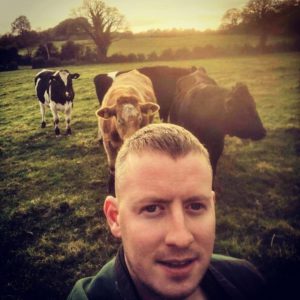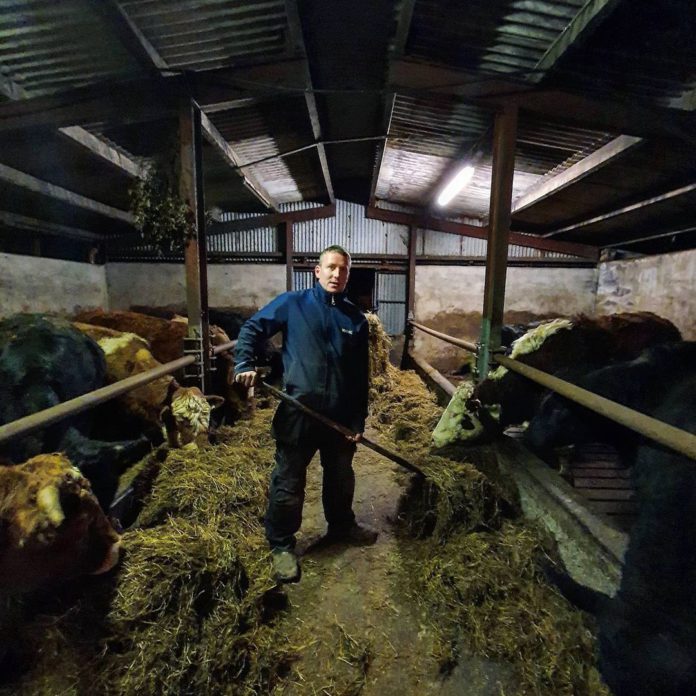Bernard Keegan (29) wears several hats as a full-time emergency medical technician, beef farmer and Green Cert student.
He took the reins of the family farm when his father, Frank, passed away and has since changed its direction. His father ran a mixed enterprise with beef, dairy, tillage, and potatoes; however, Bernard is now focusing solely on beef production.
“My father sought to improve and implement new and modern techniques in farming as well as experimenting with different enterprises on the farm,” he told That’s Farming.
“Since his death, I have had to streamline the work on the farm to allow me to juggle my job. I am also completing the Green Cert online with Westport College of Further Education, which I began in September 2020.”
Beef enterprise
The Streamstown, Co. Westmeath native, with assistance from his mother, runs a weanling-to-slaughter enterprise. He purchases bull weanlings, of traditional and continental breeds, which he castrates and finishes as steers.
He owns 110-acres in total but is leasing out 45-acres due to the nature of his off-farm position. “It’s on lease for five years to give me time to get the home farm in order for when I take over fully,” explained Bernard, who also restores machinery.
“The key areas I am focusing on at present is grass production with rotational grazing and consistent topping. As well as that, I have had to become regimental on the number of days cattle are fed meal before slaughter to avoid investing more money than required.”
“I pay attention to the quality of my silage by getting it tested each year. Also, I take soil samples which allows me to produce better grass and silage.”
One of the biggest challenges the young farmer has faced since taking over the farm has been striking a delicate balance between his work, farm, and social commitments.
“In the process of taking over the farm, I realised that a lack of extra capital on the farm became very restricting in how quick I could start improving the farm and taking care of what needed to be done.”

Emergency medical technician
Off-farm, Bernard fills the shoes of an emergency medical technician (EMT) at Medical Ambulance Service, a private firm which provides a frontline ambulance service.
He became an EMT seven years ago following voluntary work with Irish Red Cross and then attained his EMT qualification from Medical Training Institute.
“It’s not easy balancing work with farming. Great friends, family, and neighbours, coupled with time management, make it achievable and very rewarding on many levels.”
“Luckily, my working roster allows me to work 12-hours-a-day 4-days-per-week, allowing extra time for farming. As part of my day, we could be tasked with many different calls. These range from critical hospital transfers to transfers for routine hospital appointments.”
“The thing I like most about my job is the variety. Each day is different, and I get from knowing I can make a difference each day. Meeting lots of different people and hearing their stories are enjoyable aspects.”
“The most difficult aspect of the job is seeing how fragile we are as humans, regardless of our age, sex or upbringing. Unfortunately, nobody is exempt from getting sick or dying. That realisation makes my job hard at times.”
Future
Concluding, Bernard intends to increase his herd size to 100 head of cattle all-year-round, with a view to slaughtering steers every three months.
The young farmer has a burning desire to improve other aspects of his thriving enterprise. “In the future, I need to expand and improve the infrastructure of the farmyard. This will allow me to feed more cattle in the winter and improve time efficiency.”
“The future I see in beef farming in Ireland is getting more and more about the quality of stock and less about the quantity. This is what makes us stand out as a nation of beef producers.”
“We produce the best grass-fed beef in the world, and that is unmistakable. What is urgently required is a strong backbone from our representatives and government to make Ireland a viable country to be a farmer properly.”
“Until our government stops letting in foreign meats and allowing processors to do as they please, the Irish beef sector will never be all that viable or attractive for the younger generations to come,” he concluded.
Follow @bernardk1991 on Instagram.
To share your story, email – [email protected]





